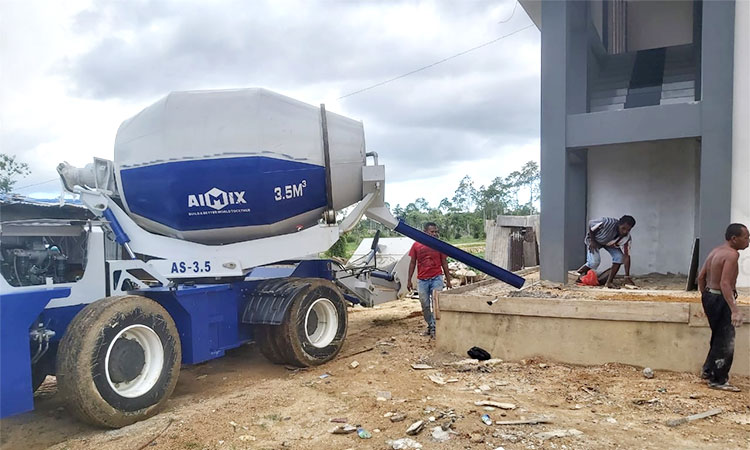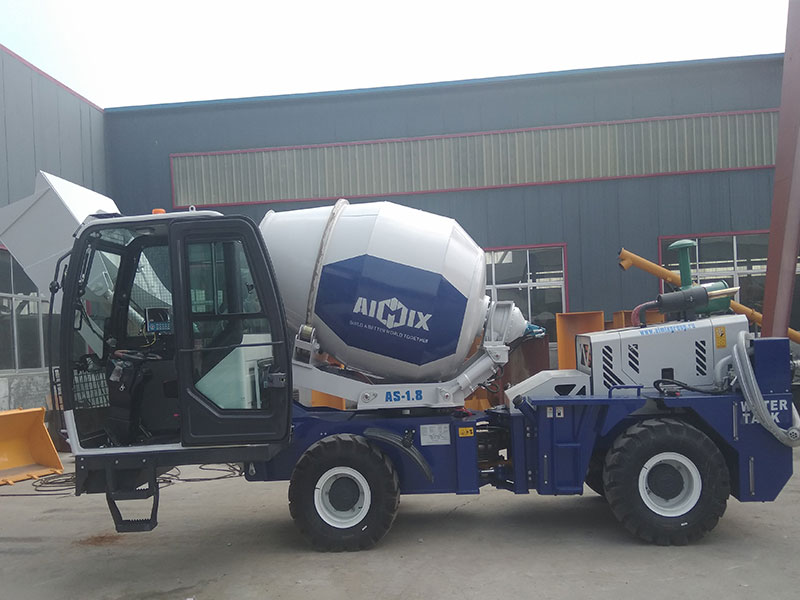Self-loading concrete mixers have become indispensable in the construction industry due to their versatility and efficiency. However, like any machinery, they can experience equipment failures, which can disrupt construction projects and lead to costly downtime.

I. Engine Issues
Common Failure: Engine problems are among the most common equipment failures for self loading concrete mixer. These issues can include difficulties with starting, power loss, or unusual noises.
Possible Causes:
Fuel-related issues, such as contaminated fuel or improper fuel quality.
Air intake problems, including clogged air filters.
Ignition problems, like faulty spark plugs or ignition coils.
Engine overheating due to cooling system failures.
Solutions:
Ensure the use of clean and high-quality fuel.
Regularly clean or replace air filters to maintain proper air intake.
Inspect and replace spark plugs and ignition components as needed.
Monitor the cooling system for leaks, and ensure the radiator and cooling fan are functioning correctly.
II. Hydraulic System Failures
Common Failure: Hydraulic system failures can result in issues with the operation of the mixing drum, loading bucket, or other hydraulic components.
Possible Causes:
Hydraulic fluid leaks due to damaged hoses, seals, or connections.
Contaminated hydraulic fluid, which can lead to reduced system performance.
Hydraulic pump or motor failures.
Solutions:
Regularly inspect and maintain hydraulic hoses, seals, and connections to prevent leaks.
Use clean and high-quality hydraulic fluid, and replace it as recommended by the manufacturer.
Monitor the condition of hydraulic pumps and motors, and replace or repair them when necessary.
III. Electrical System Problems
Common Failure: Electrical system failures can result in issues with the control panel, lights, and other electrical components of the self-loading concrete mixer.
Possible Causes:
Loose or damaged electrical connections.
Corroded or faulty wiring.
Dead or weak batteries.
Malfunctioning control panel or sensors.
Solutions:
Conduct regular inspections to identify and repair loose or damaged electrical connections.
Replace corroded or faulty wiring to ensure proper electrical flow.
Maintain the batteries by keeping them clean and charged. Replace weak or dead batteries promptly.
Diagnose and repair issues with the control panel or sensors, ensuring they function correctly. You can view more details at here: https://aimixmachinery.com/self-loading-mobile-concrete-mixer-for-sale/.

IV. Mixing Drum Blockage or Overload
Common Failure: The mixing drum can become blocked or overloaded, resulting in operational disruptions.
Possible Causes:
Accumulation of hardened concrete or foreign objects in the mixing drum.
Excessive concrete load, causing an overload.
Solutions:
Regularly clean the mixing drum after each use to prevent the buildup of hardened concrete or foreign objects.
Monitor and control the concrete load to avoid overloading the mixing drum, which can strain the system.
V. Tire and Suspension Failures
Common Failure: Tire punctures, damage, or suspension issues can impact the mobility and stability of the self loading truck mixer.
Possible Causes:
Tire punctures from sharp objects or rough terrain.
Suspension wear and tear from constant use.
Solutions:
Use puncture-resistant tires or take precautions to avoid sharp objects on construction sites.
Conduct regular maintenance and inspections of the suspension components to identify and address issues promptly.
VI. Lack of Proper Maintenance
Common Failure: One of the most significant failures for self-loading concrete mixers is the lack of proper maintenance, which can lead to various issues.
Possible Causes:
Inadequate or irregular maintenance schedules.
Neglect of routine inspections and maintenance tasks.
Solutions:
Establish a proactive and regular maintenance schedule, including routine inspections, servicing, and cleaning.
Train and educate operators and maintenance personnel on the importance of proper maintenance practices.
Conclusion
Self-loading concrete mixers are powerful and efficient machines that are essential for modern construction projects. However, like any equipment, they can experience common equipment failures. By understanding the potential causes and implementing practical solutions, construction professionals can minimize downtime, reduce repair costs, and ensure the smooth and efficient operation of their self-loading concrete mixers. Regular maintenance and proactive monitoring are key to preventing and addressing equipment failures effectively. You can contact Aimix Group Co Ltd to get more instructions.
